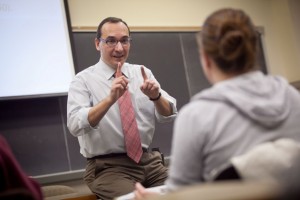
Alessandro Giovannelli, assistant professor of philosophy
In many ways, teaching undergraduates is more inspiring than teaching at the graduate level, a colleague at one of the best philosophy graduate programs in the country once told Alessandro Giovannelli. As assistant professor of philosophy, Giovannelli now understands exactly what he was talking about.
“Teaching energizes me,” he says. “It puts me in a room filled with people who have terrific intellectual capacities, though they might not always know that, and that alone keeps my mind younger. When you study a subject for a long time, you run the risk of locking yourself into one theoretical approach. Philosophy, like the search for truth in general, so often needs looking at a problem anew with a fresh mind.
“The best philosophical research always has that fresh flavor to it, and that capacity of bringing about some ‘aha’ moment. Engaging with students, with their fresh look at things, encourages and renews the research process for me.”
In 1992, when he was a visiting student at the University of London, Giovannelli decided on a career in academia. Researching his thesis on Nelson Goodman’s aesthetics, he learned that Goodman was the honoree at a symposium on his work in Paris. Giovannelli stretched his meager student budget to take the ferry across the English Channel to meet him.
“Aristotle says we learn by imitation; that’s actually the way it worked for me,” he says. “As I tried to emulate the professors I most admired, I started thinking I wanted to follow them in their professional path. At the symposium, there were researchers from France, the United States, and, from Italy, Luciano Handjaras, the very professor who had taught me so much about Goodman’s philosophy. It was at that point I decided I was going to be an academic.”
Giovannelli eagerly proves to his students that philosophy is all around them. While it does require some abstract ways of thinking, it is a critical tool in fulfilling the human desire to make sense of the world. Students need not look any further than Giovannelli’s own area of expertise, aesthetics, which examines the practice of art and the human attraction to the beauty of nature.
People devote a great deal of time thinking about and participating in art, he says. Recommending a movie, visiting an art museum, or traveling to see natural beauty like a national park are all activities that can be better understood through philosophy. Through his teaching, Giovannelli challenges his students to answer questions such as: What is art? What are its values? What contributions can aesthetic experiences make to a well-lived life?
“Philosophy lacks no relevance to our lives,” he says. “In the last few weeks in my First-Year Seminar ‘Meaning in Light: Cinema and Philosophy,’ for example, I have been discussing such topics as compassion, forgiveness, and romantic love. What could be more relevant?”
Giovannelli is especially pleased when he sees a student dig into a topic outside class. Helping a student discover more about a particular subject than what can be covered in class makes him feel he truly has a lasting impact. Giovannelli admits that, unlike some other disciplines, philosophy can be somewhat of a solitary research pursuit, but he tries to involve students in his larger projects.
Three students worked with Giovannelli as EXCEL Scholars on a book he edited called Aesthetics: The Key Thinkers. Set for publication in February by Continuum, the book is part of a series exploring the different areas of philosophy. Comprised of essays by well-known philosophers as well as junior scholars from five different countries, the volume combines historical reconstruction with a theoretical investigation of central issues in aesthetics. He also authored two chapters: “Nelson Goodman,” and “Some Contemporary Developments.” Cara Cordeaux ’10, Eric Henney ’11, and Jonathan Cohn ’12 (Allentown, Pa.) checked quotations, compared translations of philosophical works, and assessed the submitted chapters for accessibility from a student perspective.
“They were so helpful,” says Giovannelli. “All three of them gave a terrific contribution to my work. It was a very rewarding experience, at the human level, for all of us.”
For Giovannelli, it’s not so important that his students memorize specific theories, but rather that they develop an appreciation for an issue’s complexity and the ability to analyze it. He hopes to show them new ways of approaching life’s questions.
“What fascinated me about philosophy was the power of clarity and analytical thinking in addressing all sorts of issues and questions,” he says. “What matters is how convincing your reasoning is, not whether you are a famous philosopher or an undergraduate student at her first encounter with the subject. And finding the most convincing argument for one’s own thesis is so much harder – and more fun – than relying on the authority of someone else.”
A member of the Lafayette faculty since 2006, Giovannelli earned his Ph.D. at the University of Maryland, College Park. The author of numerous journal articles, book chapters, and encyclopedia entries, his research interests focus on the ways in which readers or viewers of narratives engage with characters and events and on the relationship between art and morality. He teaches courses on the philosophy of art, film, and literature as well as introductory philosophy.

1 Comment
Dr. Giovannelli’s courses sound terrific. He makes me wish I were a student of his. In my own teaching I have found the writing is also an important way to clarify and analyze an idea. This profile implies that much of philosophy is taught through discussion. But I bet that if Socrates had known about pencils and pens he’d have required his student to think, question, write, think, edit, and only then to talk.
Comments are closed.